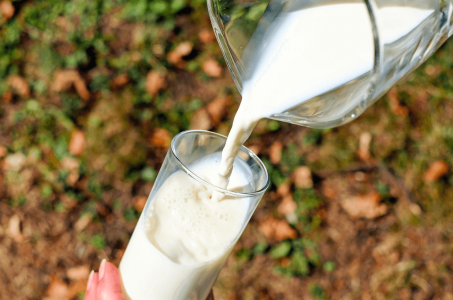The 'healthiest' milk in the supermarket, according to a dietician
- Replies 11
Strolling down the dairy aisle at the supermarket these days can feel like taking a trip around the world, with a wide variety of milk options, ranging from classic cow's milk to plant-based alternatives like almond, soy, and even oat milk.
But with dozens of choices screaming for your attention, how can you decide which milk is the real cream of the crop when it comes to your health?
Luckily, help is at hand. Dr Duane Mellor, one of Britain's leading dietary researchers, has recently shared his expertise on this fascinating subject, shining a light on the healthiest milk available in your local supermarket.
You might be surprised to hear that, according to Dr Mellor, good old-fashioned cow's milk is still the best option when it comes to nutrients, protein, and natural sugars.
While plant-based milk alternatives like almond and soy have become increasingly popular, especially as part of vegan diets, they can't quite measure up to the nutritional benefits that cow's milk provides.

Now, before you accuse us of milking this story for all it's worth, we should mention that cow's milk does come with its own share of drawbacks, such as a higher calorie count and saturated fat content compared to its plant-based counterparts.
For example, a 200ml serving of whole cow's milk contains 132 calories and 4.8g of saturated fat, while the same amount of almond milk has only 50 calories and 0.2g of saturated fat.
Unfortunately, overindulging in saturated fats can increase the risk of high cholesterol and heart disease, prompting some health-conscious folks to opt for plant-based alternatives. However, despite their lower fat and calorie content, these alternatives aren't necessarily healthier overall.
The secret lies in the nutritional content of cow's milk, which is packed with calcium for strong bones and teeth, protein for growth and repair, vitamin B12 for red blood cell production, and iodine for thyroid hormone synthesis.
Plant-based alternatives, on the other hand, can be lacking in these critical nutrients unless they are artificially fortified.
As Dr Mellor explains, 'Perhaps where the biggest nutritional difference sits is with vitamins and minerals. Although many [plant-based milk] will have added calcium, the levels of vitamin B12 and iodine vary considerably depending on how much is fortified into the plant milk alternative. It's important to check carefully organic versions as these tend to have the lowest levels of fortification with these key vitamins and minerals.'
It's also worth considering the protein content of your chosen milk. While cow's milk boasts a protein-packed 7g (or 7.2g in semi-skimmed) per 200 ml serving, plant-based milks like almond and oat offer only around 1g of protein per serving. Soy milk comes closest with about 6.5g of protein, but it still can't quite hold a candle to cow's milk in this regard.
And what about sugar, you ask? Dr Mellor assures us that cow's milk is a clear winner here, too. The sugar in cow's milk, known as lactose, is a naturally occurring, slow-digesting sugar that is considered healthier than the added sugars, fruit juices, or sweeteners found in some plant-based milk.

In conclusion, while plant-based milk may have its place when it comes to ethical and environmental concerns, cow's milk still reigns supreme when it comes to overall health benefits.
So, the next time you find yourself pondering over those confusing milk options in the supermarket aisle, remember the wisdom of Dr Mellor, and feel confident in treating yourself – and your body – to a refreshing glass of cow's milk. Cheers!
But with dozens of choices screaming for your attention, how can you decide which milk is the real cream of the crop when it comes to your health?
Luckily, help is at hand. Dr Duane Mellor, one of Britain's leading dietary researchers, has recently shared his expertise on this fascinating subject, shining a light on the healthiest milk available in your local supermarket.
You might be surprised to hear that, according to Dr Mellor, good old-fashioned cow's milk is still the best option when it comes to nutrients, protein, and natural sugars.
While plant-based milk alternatives like almond and soy have become increasingly popular, especially as part of vegan diets, they can't quite measure up to the nutritional benefits that cow's milk provides.

Cow's milk offers the most nutrients, protein, and natural sugars when compared to plant-based milk alternatives. Credit: Pixabay/Couleur.
Now, before you accuse us of milking this story for all it's worth, we should mention that cow's milk does come with its own share of drawbacks, such as a higher calorie count and saturated fat content compared to its plant-based counterparts.
For example, a 200ml serving of whole cow's milk contains 132 calories and 4.8g of saturated fat, while the same amount of almond milk has only 50 calories and 0.2g of saturated fat.
Unfortunately, overindulging in saturated fats can increase the risk of high cholesterol and heart disease, prompting some health-conscious folks to opt for plant-based alternatives. However, despite their lower fat and calorie content, these alternatives aren't necessarily healthier overall.
The secret lies in the nutritional content of cow's milk, which is packed with calcium for strong bones and teeth, protein for growth and repair, vitamin B12 for red blood cell production, and iodine for thyroid hormone synthesis.
Plant-based alternatives, on the other hand, can be lacking in these critical nutrients unless they are artificially fortified.
As Dr Mellor explains, 'Perhaps where the biggest nutritional difference sits is with vitamins and minerals. Although many [plant-based milk] will have added calcium, the levels of vitamin B12 and iodine vary considerably depending on how much is fortified into the plant milk alternative. It's important to check carefully organic versions as these tend to have the lowest levels of fortification with these key vitamins and minerals.'
It's also worth considering the protein content of your chosen milk. While cow's milk boasts a protein-packed 7g (or 7.2g in semi-skimmed) per 200 ml serving, plant-based milks like almond and oat offer only around 1g of protein per serving. Soy milk comes closest with about 6.5g of protein, but it still can't quite hold a candle to cow's milk in this regard.
And what about sugar, you ask? Dr Mellor assures us that cow's milk is a clear winner here, too. The sugar in cow's milk, known as lactose, is a naturally occurring, slow-digesting sugar that is considered healthier than the added sugars, fruit juices, or sweeteners found in some plant-based milk.
Key Takeaways
- Dr Duane Mellor, a top dietary researcher, reveals that cow's milk offers the most nutrients, protein, and natural sugars when compared to plant-based milk alternatives.
- Despite having lower calories and saturated fat, plant-based milk options can lack vital nutrients found in cow's milk, such as calcium, vitamin B12, and iodine.
- Cow's milk also contains more protein than dairy-free alternatives, with semi-skimmed and full-fat options providing between 7-7.2g of protein per 200 ml.
- The sugars in cow's milk, called lactose, are natural and slow-digesting, while plant-based alternatives can be sweetened with quickly-digesting fruit juice or added sugar.
In conclusion, while plant-based milk may have its place when it comes to ethical and environmental concerns, cow's milk still reigns supreme when it comes to overall health benefits.
So, the next time you find yourself pondering over those confusing milk options in the supermarket aisle, remember the wisdom of Dr Mellor, and feel confident in treating yourself – and your body – to a refreshing glass of cow's milk. Cheers!







